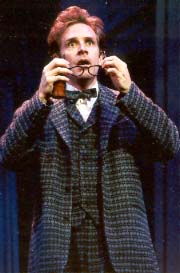
CROYDEN'S CORNER
by Margaret Croyden
|
| |
| Margaret Croyden is a theater reviewer and essayist for the New York Theatre Wire. | |
"Amour," a delightful Gallic musical
Music by Michel Legrand
directed by James Lapine
The Music Box Theater
West 45th Street
www.telecharge.com
1-800-432-7250
opened October 20, 2002
Reviewed October 23, 2002 by Margaret Croyden
A most attractive element in the musical "Amour," now playing at the Music Box theater, is that not a line of dialogue is spoken and that it takes place in Paris in the 1950's. It gives the musical a certain charm. In the style of opera bouffe, everything is sung--the plot, the characters' subtleties, the humor, the satire--the entire action.
Full of French whimsy and fantasy, the story is about a civil service employee (Malcom Gets) who has a lonely, boring life; in fact, he is the typical Mr. Nobody that one often finds in French comedies. In love with his unhappily married neighbor Isabelle (Melissa Errico), he has not got the nerve to make her acquaintance. Complaining of his humdrum existence, he suddenly discovers that he has an extraordinary "malady": he can walk through walls. And he does.
 |
| Malcolm Gets, as Dusoleil, walks through walls in "Amour" (Joan Marcus photo) |
Soon he gains strength through this hidden "affliction" and uses his new found power to do good: he walks through a glass window of a jewelry shop and gives the stolen jewels to a prostitute; he distributes stolen money to the poor, and as a result of his good deeds, he becomes a beloved folk hero (albeit unknown and therein lies the fun) whose actions create lots of outrageously delightful situations. His greatest ambition, however, is to confront Isabelle and win her love--husband or no husband, who by the way, is convicted of fraud and robbery and jailed owing, of course, to our hero. Finally he is able to achieve his dream with Isabelle. But there are consequences and it would be unfair to tell you the outcome. See this show for yourself and have a wonderful hour and a half.
Michel Legrand, the French composer, is no stranger to Broadway or to films. He is the winner of three Academy awards and his body of work includes the memorable "The Umbrellas of Cherbourg," "The Thomas Crown Affair," and "Yentil" among others. "Amour" was adapted from a story by Marcel Ayme and the director James Lapine perfectly captures the ambiance of Montmartre and, in particular, the idiosyncratic, cynical, and witty behavior of the Parisians.
Jeremy Sand's adaptation from the French libretto of Didier van Cauwelaert is full of canny aphorisms, remarkable rhymes, barbed obsrvations, and a clear cut unconfused story line. True to the Parisian style, there are the typical neighborhood characters: the prostitute, the newsboy, the painter, the policeman, the doctor, and the civil service employees. Some of them might be considered stereotapes, but the musical is a satire and the characters are there to be satirized; it gives the production a certain flavor; besides the characters' songs are funny and delivered beautifully. The singers are exemplary: clear, concise, totally audible--no mouthing, no jumbled diction, as is often the case in musicals. Nora Mae Lyng is particularly clever as the whore and had some of the best lyrics in the show.
The sets and costumes are comparatively simple but that's what I liked about the production. There is no overlay of effects, no grand decorative settings, but instead a few appropriate pieces cleverly tell us we are in the shadow of the Sacre Coeur in Montmartre. And that seemed perfectly apt. The charm of "Amour" is not in trick effects or lavish setting, but in its low key tone, its engaging story and amusing libretto.
As the man who walks through walls, Malcome Gets has a difficult role. He must play a Milquetoast at the beginning and gradually grow into a lover and a powerful man. He is well suited to the role; he and his leading lady Melissa Errico playing Isabelle are a good match.
Give credit to Gerald Schoenfeld of the Shubert organization, one of the main producers, who reportedly saw the original show in Paris and was instrumental in bringing it over here. It is a welcome change from all the heavy, and often shallow, effects of many Broadway musicals. Let's hope the public finds its way to the Music Box for a truly engaging evening. [Croyden]
Margaret Croyden's latest book, "Conversations With Peter Brook, 1970-2000," will be published in the spring by Farrar Straus and Giroux.

| museums | NYTW mail | recordings | coupons | publications | classified |